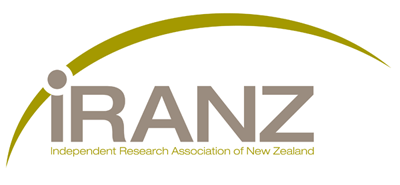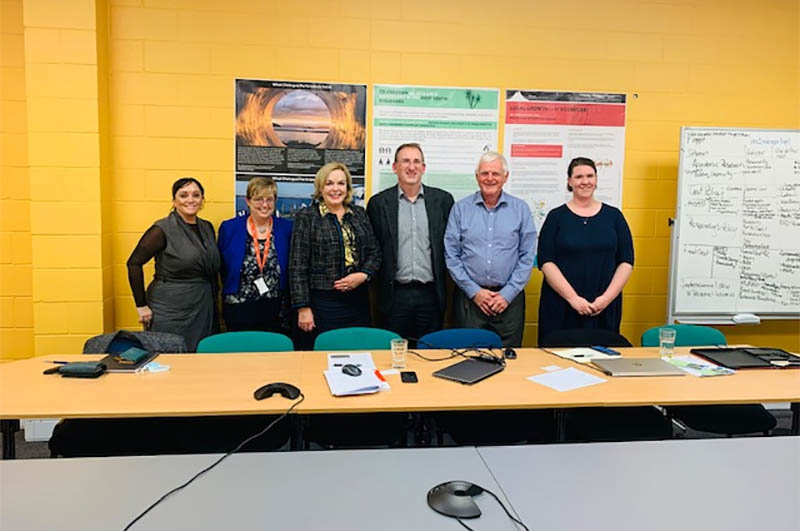IRANZ news briefs
The Hon. Judith Collins visits IRANZ
To get a feel for the independent research sector, the Opposition Spokesperson for Research, Science, and Innovation, the Hon. Judith Collins visited IRANZ on 21 June. She met with several independent research CEOs and science leaders at the Motu office and via Zoom.
She said that as science, technology, and innovation are such important components of New Zealand’s society, she doesn’t see the portfolio as being a political football.
“I would hope that no matter who wins the next election an apolitical approach is taken to RS&T. We’ll be seeking cross-party solutions to the management of the science system so we can do what is best for New Zealand.”
Issues discussed included the lack of dissemination of research into broader society/industry – an issue across the sector – there was great research being done, but not enough in the way of mechanisms to disseminate the research to make it useful.
IRANZ Chairman John McDermott, CEO of Motu, explained that this was less of a problem among Independent Research Organisations (IROs) as they tended to work closely with industry – with IROs consistently scoring highly on impact. “Reasonably good roadmaps have been developed by MPI and others, which could be used as plans for useful research investment.”
Another issue discussed with Ms Collins was a better pipeline for PhD students, with students perhaps sent out into industry as part of their training to produce useable knowledge. Ms Collins discussed a similar model in Ireland.
At present, many PhD postdocs are stuck in an endless cycle of postdoc temporary contracts with little pay, while at the same time research institutes have to look overseas for researchers with the right experience.
TTW: Māori Biosecurity Symposium first of its kind
Te Tira Whakamātaki, home of the Māori biosecurity network, will be holding a three-day wānanga to celebrate Māori biosecurity practices and connect biosecurity practitioners, in New Plymouth, from 28 – 30 July 2022.
Named ‘Te Wānanga Whakamātaki’, this symposium will provide a unique opportunity for communities, industry, and agencies to come together in a kaupapa Māori environment to consider how Māori and their mātauranga can contribute to the restoration of our natural world.
MRINZ receives Independent Research Funding from HRC
Core Independent Research Organisation (IRO) funding has been granted to the Medical Research Institute of New Zealand (MRINZ) by the Health Research Council of New Zealand (HRC).
The funding, spread over a seven-year timeframe, is awarded through a negotiated process, based on the quality, expected impact, and proposed plans for future research, aligned with national health research priorities.
The Malaghan Institute of Medical Research also received HRC IRO support in this funding round.
Malaghan: Investment in RNA tech boost for NZ science and biotech
The Malaghan Institute welcomes the 19 May Budget announcement of $40.7M over four years to support an RNA platform and R&D pipeline in Aotearoa New Zealand.
“We already have the skills and expertise across New Zealand to start applying this breakthrough science, this investment will help ensure we have the capability to make it happen and improve our nation’s health and economic productivity,” says Dr Kjesten Wiig, Malaghan Institute Director of Strategic Partnerships.
“RNA technology presents a significant opportunity for New Zealand to supercharge its thriving biotech sector and become a leader in the development of novel RNA therapeutics. This RNA platform will build on established capability to prepare New Zealand for future pandemics and ensure vaccine security.”
Dr Kerry Hilligan awarded HRC Emerging Researcher First Grant
The Malaghan Institute’s Dr Kerry Hilligan has been awarded a prestigious Health Research Council of New Zealand (HRC) Emerging Researcher First Grant worth $250,000 over three years.
Dr Hilligan’s research focuses on understanding how early infections or challenges to a developing immune system shape and influence it later in life. Her project, ‘Improving population health through education of the innate immune system,’ will help establish Dr Hilligan’s research programme at the Malaghan Institute, and build on expertise gained at the National Institutes of Allergy and Infectious Disease (NIAID) at the National Institutes of Health in Maryland, USA over the last four years.
Motu: Applications are open for Āheitanga Thesis Scholarship
Applications are open for Motu’s Āheitanga Thesis Scholarship. Every year, Motu Research offers a $10,000 scholarship pool to promising university students of Māori descent who are working on (or are planning to work on) an Honours, Master’s or PhD thesis.
Through this scholarship, Motu hopes to enhance research capacity in Aotearoa’s Māori community and encourage students of Māori descent to research topics relevant to public policy development.
Deadline for scholarship applications is 30 September 2022.
Mātai: London conference and US visit
In May, Mātai CEO & Director of Research Dr Samantha Holdsworth presented at the GE Research Summit, as part of the London 2022 ISMRM conference. The presentation garnered a lot of interest for aMRI from institutions and hospitals from around the world, and was an opportunity to reconnect with those in the global research community, exchange knowledge, and strengthen research collaborations. The 3D amplified MRI paper [https://onlinelibrary.wiley.com/doi/full/10.1002/mrm.28797] was announced as the top downloaded MRI paper in Magnetic Resonance in Medicine and Journal of Magnetic Resonance Imaging (the ISMRM society's leading MRI technical journals) for 2020 and 2021.
Three other Mātai team members presented virtually.
Maryam Tayebi (Auckland Bioengineering Institute) presented her abstract on structural and white matter fibre tract changes related to head impacts. Dr Eryn Kwon spoke remotely on 'Correlating Raised Intracranial Pressure with Increased ¬Brain Motion'. Haribalan Kumar (GE/Mātai/ABI Scientist) presented an abstract on ‘Developing a comprehensive whole body MR protocol and model generation pipeline for children’, part of the Mātai Tairāwhiti Study.
Following the London conference, Dr Holdsworth and Leigh Potter continued on to Seattle where they visited St Thomas School and the University of Washington, followed by San Francisco where they visited GE Healthcare, Stanford Children's Hospital, and the Stanford Radiological Sciences Laboratory.
Mātai welcomes Ariel Schwencke as an intern
Ariel was born and raised in America and descends from Ngāpuhi and Te Rarawa. She is a fifth year medical student at the University of Auckland. Before starting medical school, she worked in the mental health sector as an occupational therapist supporting rangatahi. While at Mātai, she hopes to make meaningful connections and develop the skills needed in order to be a future leader in the Māori community as a doctor and researcher. Ariel aspires to become a radiologist with an interest in preventative models of care to uplift the health and wellbeing of Māori.
Former Mātai Interns to return for Masters/PhD
Ben Bristow and Jet Wright, local Tairāwhiti-Gisborne students, who completed internships last summer, are now continuing their work with Mātai. Ben will complete a Masters degree focused on the impact of methamphetamine on the brain, and Jet will work on a PhD focused on using MRI to measure intracranial pressure.
Bragato: Grape Days 2022 - Winegrowing in a Changing Environment
The New Zealand wine industry gathered in June to hear the latest research presented by scientists and industry experts at the annual Grape Days events.
Held in Hawke’s Bay, Marlborough and Central Otago from 13 – 17 June, the one-day technical events were designed to share the latest industry-driven research with a practical emphasis on helping winemakers and grape growers apply the findings.
Based on this year’s theme, Winegrowing in a Changing Environment, Bragato Research Institute worked with its science partners and local industry experts to deliver a relevant and thought-provoking programme.
Bragato: Shared Vision for Land Use in Marlborough
Bragato Research Institute is delighted to have received funding through Our Land and Water National Science Challenge to research a shared vision for land use in Marlborough. Led by Michelle Barry, together with AERU, AgResearch, Market Economics, and Ramona Radford, this project will explore the potential to increase the diversity of farm systems in Marlborough to address the region's social, environmental, and economic challenges.
Bragato welcomes Dr Carmo Vasconcelos
Dr Carmo Vasconcelos has joined Bragato Research Institute as the Extension Specialist. Carmo has a PhD in grapevine physiology and an extensive career in research and teaching in NZ, Europe and the US. She is well-known within the New Zealand wine research community. Carmo was a Senior Scientist at HortResearch Marlborough where she conducted research on Pinot Noir, and was an Associate Professor of Viticulture at the EIT in Napier from 2013 to 2017.
Dragonfly Data Science: Wellington stopover for Cambridge-bound student
Amelia Cordwell is contributing her data science skills at Dragonfly before heading to England on a Cambridge-Rutherford Memorial PhD scholarship.
She finished an honours degree at the University of Auckland in 2020 but decided to defer her PhD because of the Covid-19 pandemic.
“I wanted to be in a non-academic environment for a while. I’d heard about Dragonfly when I was working as a software developer and really liked the company. People were doing cool science but were outside the academic system.”
Cawthron: Nelson students become time-travelling lake detectives
Cawthron scientists have been teaching local students about the biggest ever study of Aotearoa New Zealand lakes.
Lakes 380 is a national research programme co-led by Cawthron and GNS Science which began nearly five years ago. By collecting and analysing water and sediment samples from approximately 10% of Aotearoa’s 3800 lakes, scientists are documenting the history of the lakes to better protect them in future.
Jonathan Puddick (JP), a Cawthron scientist working on Lakes 380 project, said they were inspired to share their work with students because lake restoration is a multi-generational journey.
"Nearly half of Aotearoa’s lakes have poor or very-poor water quality and we need to do something to halt and reverse that decline in lake health. One of our best hopes for protecting the health of our precious lakes is to get our tamariki passionate about them."
Aqualinc: effluent pond leak testing
Aqualinc has recently upgraded its pond testing equipment, increasing the degree of accuracy, and saving time with a much easier to set up and dismantle system. The team has been busy this year carrying out tests on effluent ponds as part of a farm’s Good Management Practice (GMP), with many tests being completed during these winter months. In the past, it’s been a common misconception that these tests must be carried out when a dairy shed is not being used as this prevents inflows during the test. However, with the equipment, process, and analysis, Aqualinc says there is no reason that the tests can’t be completed at any time of year.
Date posted: 29 June 2022

